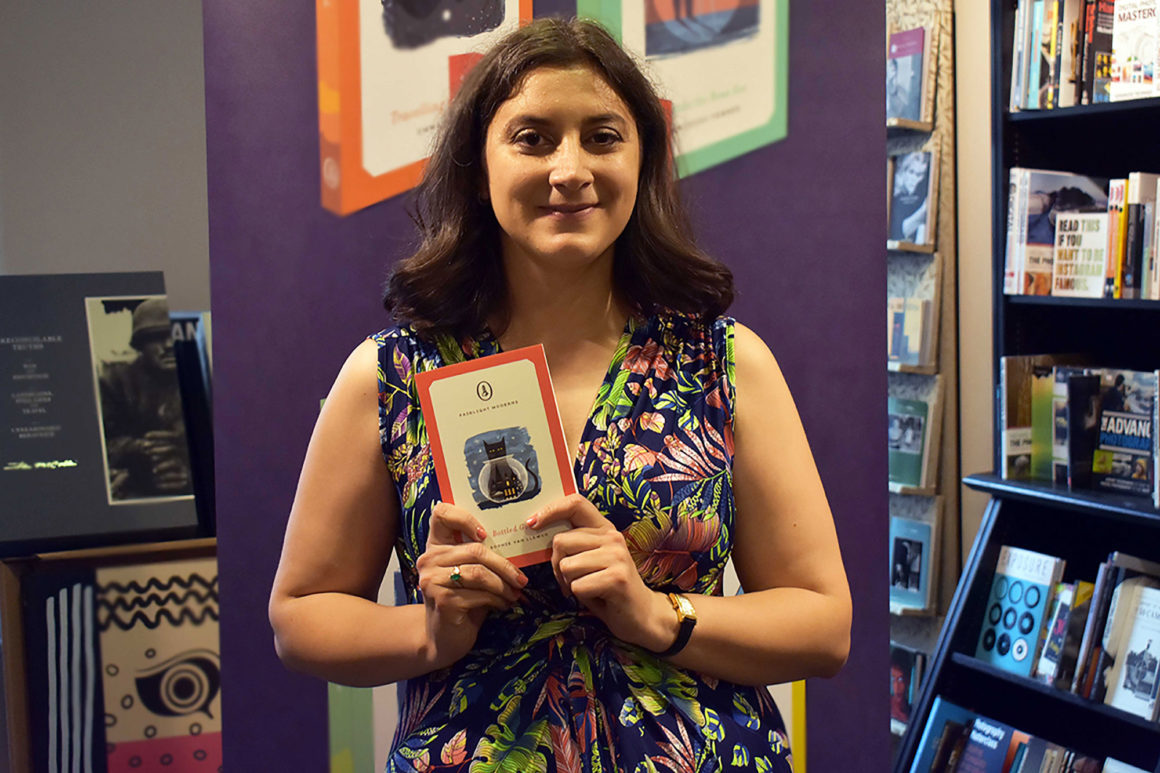Sophie van Llewyn is what we may call a citizen of the world. Born in Romania, living and working in Germany, and writing in English, her name might not sound very familiar yet, but her most recent book,”Bottled Goods”—a combination of realistic fiction and magical realism inspired by Romanian folklore—generated quite a buzz recently, and is very likely to appeal to both foreign and Romanian readers.
The publisher’s website describes the book as follows:
When Alina’s brother-in-law defects to the West, she and her husband become persons of interest to the secret services, causing both of their careers to come grinding to a halt. As the strain takes its toll on their marriage, Alina turns to her aunt for help – the wife of a communist leader and a secret practitioner of the old folk ways. Set in 1970s communist Romania, Sophie van Llewyn’s novella-in-flash draws upon magic realism to weave a tale of everyday troubles, that can’t be put down.
Juggling her many roles of wife, mother, doctor, and writer, Sophie kindly found time to answer a few questions about her book, and writing in general.
Mini-interview with Sophie van Llewyn
Your novella-in-flash “Bottled Goods” has received a lot of media attention lately, being longlisted for several prizes, most recently for Women’s Prize for Fiction. For Romanians it’s easier to resonate with your book, but how did other people respond to it, did you get any feedback from your readers?
I was amazed to see that so many people from the UK were interested in the Communist Romania of the 1970s! The reception has been much warmer than I expected it to. I think there’s a lot of interest in what happened behind the Iron Curtain during the Cold War. And I think a Western European reader can truly connect to Alina on a human level. Her wishes and desires and not much different from the ones of a contemporary woman. She wants a job that she enjoys, a man who loves her, and craves for that perfect pair of jeans.
I must admit the magical realism elements in your book took me by surprise. Why magical realism? Is it something you’re drawn to or did you just feel it would fit the story?
As a teenager, I used to adore the South American writers—Isabel Allende, Gabriel García Márquez, Mario Vargas Llosa. They’re writers who make use of magical realism, and it feels organic to their stories. So it was a genre I was drawn to from the very beginning.
When I wrote “Bottled Goods”, I didn’t sit down, telling myself, ‘Well, this story is going to incorporate magical realism.’ This part grew organically from the elements of Romanian folklore I drew upon in the novella, and from the dynamics between characters. That was where Alina’s story wanted to go—and I allowed it to.

You said in an interview that you used to write as a kid—in Romanian—and then you stopped, for a long time. How did you find your voice in English and why English, and not German or Romanian, for instance?
I did recently publish a short essay in Romanian (which I also translated into German) in a German anthology called “All over Heimat”. But that’s about it. That’s true, I usually write in English, and it was a conscious decision.
I thought the path to publication was so much clearer in the English-speaking world, and it’s true. There are so many online and print magazines. It’s so easy to connect with other writers—I have been in an online writing group for almost three years, and my critique partners live in the USA and the UK. And it’s so easy to access online workshops, and improve yourself as a writer. Living abroad, it would have been quite impossible for me to find my way into being published in Romania.
What kind of research—if any—do you do? I imagine that for “Bottled Goods” you relied on your family’s stories or maybe your own childhood memories, but how about your recently finished novel, set in WWII?
I tend to write about the themes that interest me most. When I wrote my WWII novel, I was very interested in the women codebreakers at Bletchley Park, about this unbelievable set of people who challenged the view that women had to be confined to household, or menial tasks. I had a story in mind for my main character, but I read a lot on the subject before I started writing. There was a lot of research involved, not only about the women, but about Bletchley Park in general, and WWII in Britain, the Home Front, etc. It didn’t feel like hard work, though. I was genuinely interested in the period. And, of course, I did on-site research by visiting the Park itself.
You wrote flash-fiction, stories, a novella, now a novel—what’s your favourite form and which one do you find more challenging?
I don’t think I have a favourite form. If I have a story in mind, it will find the shape best suited for it. I carried the idea for “Bottled Goods” for months with me, trying to write it as a short story, as a traditional novella, as a novel. I couldn’t properly start writing it, though, until I tried the novella-in-flash. I believe myself a novelist at my core. And I’d have to say I find short stories by far the most challenging form.
If you could recommend a few Romanian authors or books, who / which would they be?
I find it very interesting that you’re asking this! Last year in May I appeared on the BBC Radio 4 show “Open Book”. A listener, a teacher, had asked about Romanian literature, and about a few essential reads that would help him come in touch with the culture of his Romanian students. I had to choose 3 books.
My first choice was a classic: “Baltagul” (“The Hatchet”) by Mihail Sadoveanu. I always thought this book showed so much about the resilience of the Romanian people, the importance of customs and folklore in their day-to-day lives. Also, it featured a strong female character.
My second choice was “Dimineață Pierdută” (“Wasted Morning”) by Gabriela Adameșteanu. The book covered wonderfully so many years of Romanian history, so many atrocities that came to happen during WWI and after the Communists came to power, and I thought it showed a deep understanding of the human character.
My third choice, and perhaps my favourite Romanian book ever, was Dan Lungu’s “Sînt o baba comunistă” ( “I’m an Old Commie!”). For me, this book was sheer brilliance. The quintessence of Romanian society during the Communist era, and afterwards, a perfect distillation of Romanian attitudes towards life, marriage and memory. Written with so much typically Romanian wry humour. I just adored it.
You can listen to the show here.
Photos courtesy of Fairlight Books.











